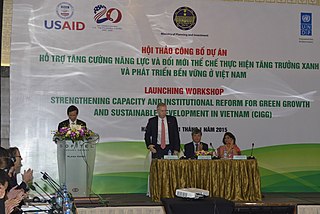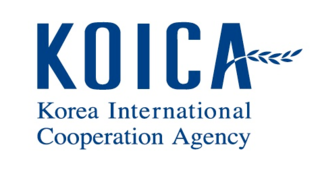Related Research Articles

The United Nations Development Programme (UNDP) is a United Nations agency tasked with helping countries eliminate poverty and achieve sustainable economic growth and human development. The UNDP emphasizes developing local capacity towards long-term self-sufficiency and prosperity.

The Directorate-General for European Civil Protection and Humanitarian Aid Operations, formerly known as the European Community Humanitarian Aid Office, is the European Commission's department for overseas humanitarian aid and for civil protection. It aims to save and preserve life, prevent and alleviate human suffering and safeguard the integrity and dignity of populations affected by natural disasters and man-made crises. Since September 2019, Janez Lenarčič is serving as Commissioner for Crisis Management in the Von der Leyen Commission.

The United Nations Assistance Mission in Afghanistan is a UN Special Political Mission tasked with assisting the people of Afghanistan.
Aid effectiveness is the degree of success or failure of international aid. Concern with aid effectiveness might be at a high level of generality, or it might be more detailed.

Capacity building is the improvement in an individual's or organization's facility "to produce, perform or deploy". The terms capacity building and capacity development have often been used interchangeably, although a publication by OECD-DAC stated in 2006 that capacity development was the preferable term. Since the 1950s, international organizations, governments, non-governmental organizations (NGOs) and communities use the concept of capacity building as part of "social and economic development" in national and subnational plans. The United Nations Development Programme defines itself by "capacity development" in the sense of "'how UNDP works" to fulfill its mission. The UN system applies it in almost every sector, including several of the Sustainable Development Goals to be achieved by 2030. For example, the Sustainable Development Goal 17 advocates for enhanced international support for capacity building in developing countries to support national plans to implement the 2030 Agenda.

The United Nations Office for Project Services (UNOPS) is a United Nations agency dedicated to implementing infrastructure and procurement projects for the United Nations System, international financial institutions, governments and other partners around the world. The organization's global headquarters is located at the UN City campus in Copenhagen, Denmark. UNOPS is in charge of disbursing more than $3 billion worth of development projects and contracts for its partners every year. Its activities have ranged from managing the construction of schools in Afghanistan, to building shelters in Haiti, to procuring ambulances to support the Ebola response in Liberia. More recently, UNOPS was a key partner to more than 80 countries and territories in their response to the COVID-19 pandemic.

The Directorate-General for International Partnerships is the European Commission department responsible for international development policy. It operates under the authority of the European Commissioner for International Partnerships, Jutta Urpilainen.
DARA is an independent, international organization based in Madrid, Spain. DARA was established in 2003 by Silvia Hidalgo to assess the impact of humanitarian aid and to make specific recommendations for changes in policies and practices. DARA has carried out evaluations in more than 60 crises countries for a variety of organizations including United Nations agencies, the International Federation of Red Cross and Red Crescent Societies, the European Commission, governments and non-governmental organizations (NGOs).

The United Nations Sustainable Development Group (UNSDG), previously the United Nations Development Group (UNDG), is a consortium of 36 United Nations funds, programs, specialized agencies, departments and offices that play a role in development. It was created by the Secretary-General of the United Nations in order to improve the effectiveness of United Nations development activities at the country level.
Afghanistan Information Management Services (AIMS) is a Kabul-based Afghan non-governmental organisation (NGO). It specialises in the application of information, communication and technology solutions, software development, and project management.
The National Disasters Management Institute is the disaster relief agency of Mozambique.
The International Aid Transparency Initiative (IATI) is a global campaign to create transparency in the records of how aid money is spent. The initiative hopes to thereby ensure that aid money reaches its intended recipients. The ultimate goal is to improve standards of living worldwide and globally reduce poverty. The IATI also publishes a standard to be used by organizations, allowing different datasets to be combined and shared.

The Korea International Cooperation Agency was established in 1991 by the Ministry of Foreign Affairs of South Korea as a governmental organization for Official Development Assistance (ODA) to enhance the effectiveness of South Korea's grant aid programs for developing countries by implementing the government's grant aid and technical cooperation programs. It is led by three-year-term president of the board who is appointed by the President upon the recommendation of Foreign Minister.
Indian Technical and Economic Cooperation Programme (ITEC) is a bilateral assistance programme run by the Government of India. It is a demand-driven, response-oriented programme that focuses on addressing the needs of developing countries through innovative technological cooperation between India and the partnering nation. Along with its corollary the Special Commonwealth Assistance for Africa Programme, ITEC covers 158 countries across Asia, Africa, Latin America, Central and Eastern Europe, and several Pacific and Caribbean nations. Since its inception, the programme has spent over US$ 2 billion and benefited thousands of students and professionals from around the globe and annual expenditure on the programme has averaged US$ 100 million per annum in recent years.
The Water Supply and Sanitation Collaborative Council (WSSCC) was a United Nations-hosted organization contributing to Sustainable Development Goal 6, Target 6.2 on sanitation and hygiene. It was established in 1990 and closed at the end of 2020. WSSCC advocated for improved sanitation and hygiene, with a focus on the needs of women, girls and people in vulnerable situations.
Monitoring and Evaluation (M&E) is a combined term for the processes set up by organizations such as companies, government agencies, international organisations and NGOs, with the goal of improving their management of outputs, outcomes and impact. Monitoring includes the continuous assessment of programmes based on early detailed information on the progress or delay of the ongoing assessed activities. Evaluation involves the examination of the relevance, effectiveness, efficiency and impact of activities in the light of specified objectives.
Synergy International Systems, Inc. is an information technology and consulting company based in Washington, D.C. that provides web-based software to international development agencies, country governments, NGOs and private sector partners. The key products focused on monitoring and evaluation (M&E), national development effectiveness, and aid management, judicial system modernization, social protection, public financial management, disaster relief and reconstruction, environment, education, and public health. There is a company-maintained a global learning center in Yerevan, Armenia. The company's services include software development and customization, IT strategy consulting, systems integration, capacity development and technical support. Synergy has developed management information systems for public and private sector clients in 65 countries.
Four high level forums on aid effectiveness were held between 2003 and 2011 as part of a "continuous effort towards modernising, deepening and broadening development co-operation and the delivery of aid" coordinated through the OECD. They took place at Rome (2003), Paris (2005), Accra (2008) and Busan (2011).

ITF Enhancing Human Security is a humanitarian, non-profit organization founded by the Republic of Slovenia., which specializes in land mine clearance and post-conflict reconstruction. It was established on 12 March 1998 with the purpose of helping Bosnia and Herzegovina in its post-conflict rehabilitation, specifically with mine clearance and assistance to mine victims.
References
- ↑ "Aid – isiAfrica". isiafrica.net. Retrieved 2016-03-04.
- ↑ "Comparative Experience: Aid Information Management Systems in Post-Conflict and Fragile Situations" (PDF). United Nations Development Programme. 2010-10-01.
- ↑ Samuel Moon with Zachary Mills (2010-07-01). "Practical approaches to the aid effectiveness agenda "Evidence in aligning aid information with recipient country budgets"" (PDF). Overseas Development Institute and Publish What You Fund.
- ↑ "How have aid for trade flows evolved?" (PDF). OECD, WTO.
- 1 2 "Ministry of Planning and International Cooperation DAD YEMEN FACT SHEET" (PDF).
- 1 2 "Federal Ministry of Budget and National Planning of Nigeria, DAD Nigeria".
- ↑ "Development Assistance Database (DAD)". 2011-11-01.
- ↑ "AIMS and public financial management".
- ↑ ISLAMIC REPUBLIC OF AFGHANISTAN; BAWAAR Consulting Group (2010-01-01). "JOINT EVALUATION OF THE PARIS DECLARATION PHASE 2:ISLAMIC REPUBLIC OF AFGHANISTAN" (PDF).
- ↑ United Nations Development Programme (2011-02-24). "FRAGILE STATES PRINCIPLES.Good Practice Cases" (PDF).
- ↑ Andrew Rathmell, Paul S. Frederiksen,Shannon Hayden, Sasha Kishinchand (2007-08-01). "Strengthening Capacity Building and Public-sector Management in Iraq: A Report of the Post-Conflict Reconstruction Project Center for Strategic and International Studies" (PDF).
- ↑ United Nations Development Programme. "2013 Resident Coordinator Annual Report, Lesotho" (PDF).
- ↑ "Pakistan" (PDF). Organisation for Economic Co-operation and Development. 2012-09-09.
- ↑ "PAPUA NEW GUINEA" (PDF). Organisation for economic co-operation and development.
- ↑ Richard Newfarmer; Michele Savini; Zangrandi Mariana Vijil (2013-01-12). "MANAGING AID FOR TRADE AND DEVELOPMENT RESULTS: Rwanda Case Study" (PDF). OECD, IGC.
- ↑ Stuart Black; Jörg Nadoll; Yaw Adu-Boahene (2009-09-01). "End-of-Project Evaluation of'Support to Development Assistance Coordination Office'& Review of Sierra Leone's Aid Coordination Architecture" (PDF).
- ↑ "Sri Lanka Deploys Housing Tracking Module in Synergy Development Assistance Database and Portal; eGovernment Solution Gives Transparent View of Asian Tsunami Recovery Progress". Business Wire. 2006-06-22.
- ↑ "Improving Aid Effectiveness in Somalia". United Nations Development Programme.
- ↑ "Solomon Islands Aid Coordination and Management". United Nations Development Fund.
- ↑ "Support to better coordination and management of international aid/assistance (through establishment of the development assistance database - DAD)". United Nations Development Programme. Archived from the original on 2016-03-07.
- ↑ David Watson; Nguyen Minh Thong; Julia Zinke (2007-09-01). "Provision of Technical Assistance Personnel in Vietnam" (PDF). European Centre for Development Policy Management.
- ↑ "Evaluation of the Joint Assistance Strategy for Zambia (JASZ) 2007-10" (PDF). Ministry of Foreign Affairs of Denmark. 2010-06-01.
- ↑ "Business Toolkit for Russian Enterprises "Professional Associations Component"" (PDF). Deloitte Touche Tohmatsu JLA Group Ltd. 1996-09-01.
- ↑ "Directory of U.S. Technical Assistance Activities in Russia". 1996-09-01.
- ↑ "Study to Establish a Donor database in the Kingdom of Swaziland" (PDF). Government of Swaziland With Support from UNDP. 2012-09-01.